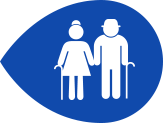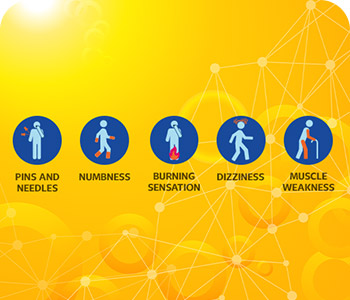Which populations have a higher probability for nerve impairments?
There are groups of people that are more likely to develop nerve impairments and experience symptoms of nerve damage like tingling, numbness or unstable gait that is often reported as dizziness.
Not all of them know their risk of running into nerve health problems. Lack of information about nerves, and confusing nerve health with brain function and memory, happen often and doesn’t help.
If you belong to one of these groups, contact your doctor and discuss with him your potential risk of developing nerve impairments.
These populations might have a higher probability for nerve impairments.
What makes these groups more at risk of nerve impairments and of the disease called peripheral neuropathy?
There are multiple conditions that expose them to develop nerve impairments and people that belong to these groups can be at risk for many reasons. Sometimes there can be just one cause but in the majority of cases there are several.
Let’s see why:





Regardless of the causes, it is advisable for all groups to avoid nerve impairment risk factors, where possible.
Other populations at risk of nerve impairments
Sometimes symptoms of nerve impairments occur and although you visit doctors and do analysis, the cause may not be easily detected. It might be the case when there isn’t a specific symptom.
This condition is known as “idiopathic peripheral neuropathy”, where “idiopathic” means “of unknown cause”. Idiopathic peripheral neuropathy happens to occur in people over 60 years old; if it progresses, even slowly, it may become very disruptive to someone’s normal life.
Besides the main groups listed above, other conditions increase the risk for nerve impairment.
Let’s see some of them:
• Patients with renal impairment, failure or in dialysis; | • Medications which influence metabolism or absorption of nutrients like metformin, proton pump inhibitors, chemotherapeutics or HIV/AIDS treatments; |
• Patients with gastrointestinal diseases like anorexia, diarrhea, inflammatory bowel diseases, H. pylori infections, after bariatric surgery; | • Physical injuries or trauma, such as motor vehicle accidents, falls or sports injuries. Trauma that can damage peripheral nerves; |
• Malnutrition (people with limited access to food or unbalanced nutrition); | • Genetic causes (people that have a family member that suffers from neuropathy). |
• Exposure to toxins and chemicals, e.g. arsenic; |
You can’t feel them and often you don’t mention them.
Specific symptoms that you would not notice and which can be related to nerve impairment
You can’t feel them and often you don’t mention them.
Specific symptoms that you would not notice and which can be related to nerve impairment
You can’t feel them and often you don’t mention them.
Specific symptoms that you would not notice and which can be related to nerve impairment
You can’t feel them and often you don’t mention them.





